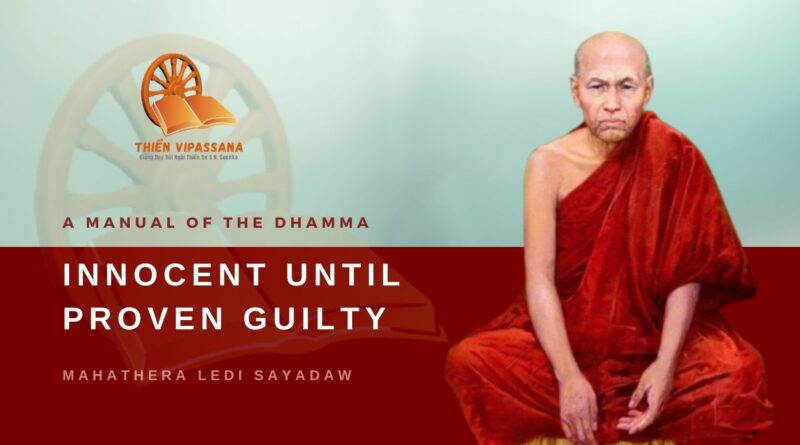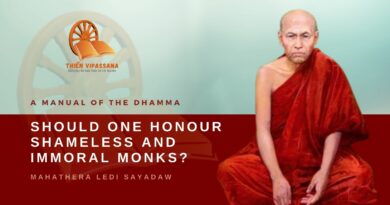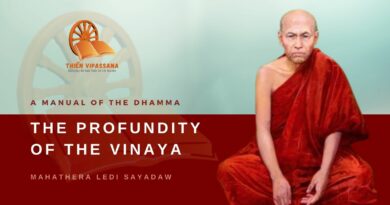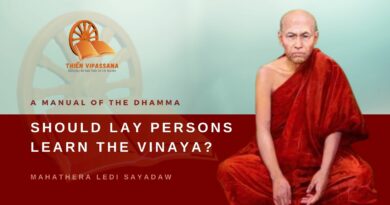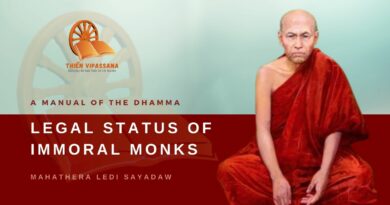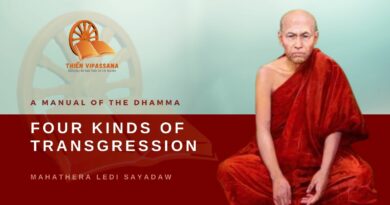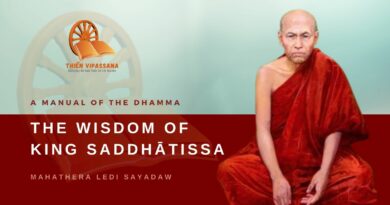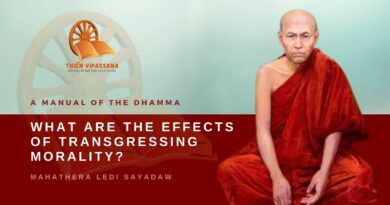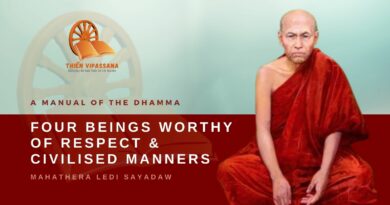Innocent Until Proven Guilty
The principles of Vinaya are subtle. One must think deeply on them before one can pass judgement on a novice or monk.
Let us give an example. During the time of British rule in Burma, the government conferred administrative powers on Township Officers. These officers, after appointment, could try particular cases, pass judgement according to specific rules, and prescribe suitable punishments. If they committed some offences themselves, these officers must, according to government servant conduct rules, lose their offices, while other offences resulted in suspension of duties only. These latter offences could be cured by the payment of fines. The nature of each office, its powers, types of offences and appropriate punishments were published in the Civil Service Act. According to this Act, a Township Officer automatically assumed powers conferred by the Government at his appointment. Regulations that would lead to his dismissal from office only applied when he committed specific offences. When he was dismissed, all his powers disappeared. Some misdeeds, however, caused him to pay fines, but did not lead to his dismissal; so he retained his office and still tried the cases of others. The powers conferred when assuming office, remained intact, though he himself suffered fine-paying punishment for some wrongful acts. This example is to clarify the different types of offences committed by a novice or monk.
In the Vinaya rules two main categories can be seen.
- Samādāna sīla — One takes vows and makes a determination to observe the numerous precepts. This is called “undertaking morality.” It includes the rules undertaken implicitly by performing the ordination ceremony.
- Saṃvara sīla — The life of a novice or monk carries a moral duty of restraint. This is called “morality of restraint.” The restraint of the senses from sensuality is a duty of voluntary moral endeavour.
Once a novice takes the three refuges in the proper way, he automatically fulfils “undertaking morality” with this formal act. However, “morality of restraint” needs the effort to observe a precept when a chance to break it occurs. For this type of morality, a novice must cultivate the confidence and will to practise the teaching. Then he must refrain from breaking a particular rule if a chance to break it occurs.
As mentioned already, there are two types of purification or punishment for a novice. If he breaks a rule deserving expulsion, he automatically forsakes the Three Refuges, and all precepts that he had undertaken are thereby given up. Not a single training rule remains intact. If he transgresses a rule that calls for punishment or purification, he retains the virtue of taking the Three Refuges, and he still observes the precepts. Even breaking of a precept in this case does not destroy his undertaking. He retains the novice’s precepts and status. He has only broken and defiled his restraint, not his undertaking. So if he observes the prescribed punishment for purification, his purity of restraint is re-established.
In the case of a monk’s precepts, he receives them all as soon as the fourth kammavācā recitation is completed in the ordination hall. He automatically undertakes the monks’ precepts by following the ordination procedure. As for the purity of restraint, it is the same as for a novice. He must train himself in the morality of restraint.
If a monk breaks one of the four rules of defeat, all the precepts he has undertaken are automatically lost. Not a single precept or discipline remains with him. However, if he breaks any rules other than those of defeat, he has only broken and defiled his restraint of those particular rules — his undertaking of the bhikkhus’ training remains intact. This is the power of the Vinaya.
Thus a clear distinction must be made between breaking his undertaking of the bhikkhus’ training, and the breaking of his restraint. Only then can one clearly know whether a novice or a monk is shameless or immoral. This is a fundamental distinction according to the Vinaya.
Due to the establishment of the Vinaya by the command of the Omniscient Buddha, a monk undertakes more than nine billion precepts on completion of the ordination ceremony. Even if he becomes shameless immediately, since he is still a monk because of the remaining training rules, he is worthy of respect and offerings from the laity. He is clearly an honourable monk who can receive the worship and respect of the laity.
To determine whether a monk becomes immoral, depraved, and fallen, numerous points should be analysed. The rules in this regard are very subtle. The Omniscient Buddha’s Vinaya prohibitions and regulations are based on his incomparable power and boundless compassion, so they are profound and subtle. They are full of surprises too. Great is the nature and scope of the Vinaya discipline, which is very profound.

